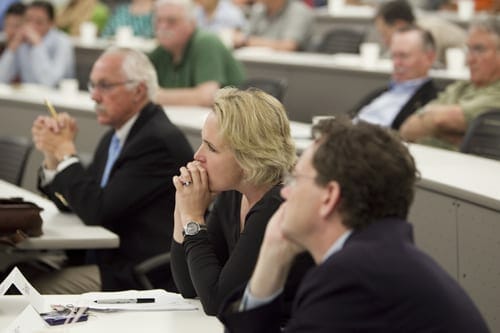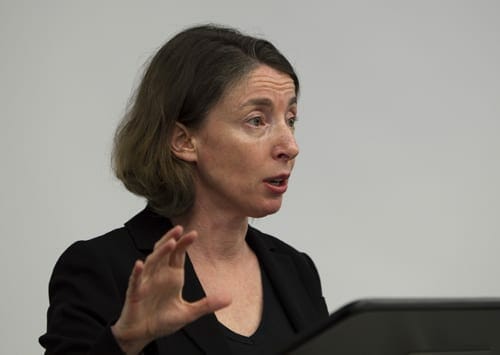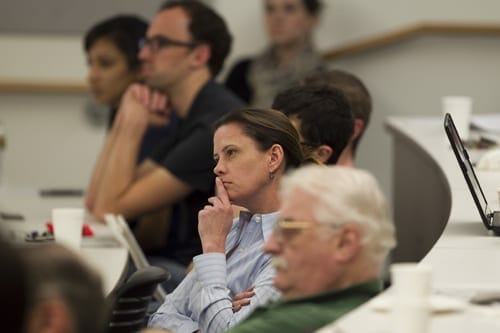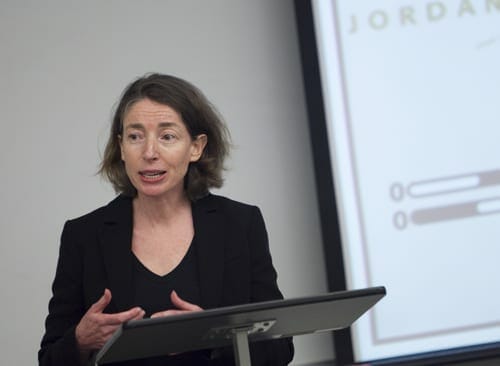By Program

The Iraq Legacy: Learning the Right Lessons
April 29, 2013 | 12:15:00 | Sid Richardson Hall Room 3.122

On April 29th, Strauss Center Associate Director Celeste Ward Gventer introduced the last speaker in the International Security Speaker Series for this semester, Emma Sky. Emma Sky, who was a political adviser to General Ray Ordierno in Iraq, discussed the current situation in Iraq, how the Iraq War has affected the region, and the lessons that could be drawn from the US intervention.

Emma Sky began with a description of Iraq one year after US troops left the country. She described an Iraq with signs of increasing prosperity: bustling cities, booming construction, and record oil exports. Notwithstanding these positive signs, Sky warned that there are many the problems hiding beneath the surface. Her discussions with Iraqis revealed fears that the country was falling apart and stories of a government crippled by corruption. Sky explained that these problems are due to conflicts between Iraqi elites that have prevented the formation of a stable government and society. She relayed that the Sunni minority feels increasingly alienated, which in turn fuels instability as it undermines Sunni moderates and strengthens the narratives of Sunni extremists.

Sky continued by describing how the war has affected the entire region. She explained that the collapse of the Iraqi state fueled sectarianism in the region, and that the invasion led to the radicalization of Muslims around the world. As to whether or not the US invasion of Iraq played any role in influencing the Arab Spring, Sky says that in her conversations with local people, many reject such a notion out of hand. According to these conversations, protesters were not motivated by the sudden fall of Saddam; instead, they were motivated by the conditions specific to their own localities.

Sky concluded by listing three major lessons that we could take from the Iraq experience. First, that there are limitations to US power, and that the US general public as well as policymakers must remember that often our ability to control outcomes is very limited. Secondly, successful nation-building must focus on the political situation of the country. No new government can succeed and be truly democratic if the nation’s elites do not buy into the plan. A political agreement involving all parties must be reached; it will not be a workable agreement if any segments of the population are excluded. And third, for an intervention to be successful it requires international legitimacy. She explained that the US intervention faced significant barriers from the start due to the international opposition to the invasion.

To view the full lecture, see the below video:
Emma Sky is a Senior Fellow at Yale University’s Jackson Institute, where she lectures on the New Iraq and Middle East Politics. Previously, she was a Visiting Professor at King’s College, London, War Studies Department, and a Fellow at Oxford, Changing Character of War Programme. She was a Spring 2011 Fellow at Harvard University’s Kennedy School of Government. Emma is a British citizen who has worked at senior levels on behalf of the US and UK governments, in Iraq, Afghanistan and Jerusalem, across the fields of development, defense, and diplomacy, and with multi civilian and military agencies:
- Political Advisor to the Commanding General of US Forces Iraq (US General Odierno) in Baghdad, Sept 2008 ” Sept 2010
- Special Advisor on Reconciliation to the Commanding General of Multi-National Forces Iraq (US General Petraeus) in Baghdad, May/June 2008;
- Special Advisor to the Commanding General of Multi-National Corps Iraq (US Lieutenant-General Odierno) in Baghdad, 2007;
- Development Advisor to the Commander of NATO’s International Security Assistance Force (Italian Lieutenant-General Del Veccio and UK Lieutenant-General David Richards) in Kabul, 2006.
- Political Advisor to the US Security Co-ordinator for the Middle East Peace Process (US Lieutenant-General Kip Ward) in Jerusalem, 2005.
- Governorate Co-ordinator of Kirkuk for the Coalition Provisional Authority, 2003/2004

Prior to 2003, Emma has over a decade of experience working in Bangladesh, Brazil, Egypt, Jordan, Morocco, Nepal, Nigeria, Pakistan, Palestinian Territories, and United Arab Emirates. She provided technical assistance on poverty elimination, human rights, justice public administration reform, security sector reform, and conflict resolution. Emma has substantial experience with the British Council in managing international development projects on behalf of the UK Department for International Development, the UK Foreign and Commonwealth Office, the World Bank, and the European Commission.
Emma’s formal education was at Oxford (UK), Alexandria (Egypt), Hebrew University of Jerusalem (Israel) and Liverpool (UK). Emma has traveled widely in Africa, Middle East, South Asia, and Europe. She speaks Arabic, Hebrew and French. Emma has published numerous articles including in Foreign Affairs, Foreign Policy, Survival, US Institute of Peace, and the Journal of the Royal United Services Institute for Defence and Security Studies. Emma was made a Member of the British Empire in 2003 and an Officer of the British Empire in 2008.


